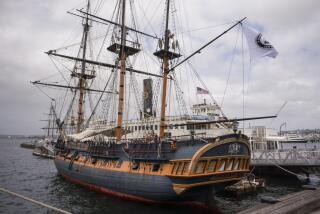Sailing Through Life : At 69, Ward Is a Product of the Ocean, Which Always Has Been His Home
- Share via
It’s the late 1920s and cowboys patrol Malibu’s vast expanse of rolling hills and coastline, owned by the powerful Rindge family. Tourists descend the Santa Monica bluffs in their motorcars to spend a warm Sunday afternoon at the beach, but young Jack Ward is hard at work, peddling the fish he caught the night before.
Fast-forward to Dec. 7, 1941. Ward and his buddies, recent high school graduates, have just finished a rabbit hunt on the grassy plains near Valencia. News on the car radio tells them that Pearl Harbor has been bombed by the Japanese.
They rush home to enlist and Ward’s “bachelor club” of 21 members splits up.
Most are sent overseas, but Ward, a sailing champion and master boat-handler, winds up in the Coast Guard, a trainer of officers in his back yard at the Catalina Island isthmus, where he is certainly at home but not at all happy.
“I really felt like a slacker,” he says years later from a booth in a restaurant overlooking the fleet of boats at CISCO Sportfishing in Oxnard. “Some of them got killed.”
Ward becomes increasingly familiar with the local waters as he sails the Channel Islands in training exercises. He wishes he could be in the real war.
When the war finally ends, Ward’s love of the sea is ingrained.
He spends every minute he can in, on and around it. He is befriended by the owner of the Malibu Pier Co., and the course of his life is set.
Captain Jack, he comes to be called, a legend in the industry with exploits in sportfishing that span more than 60 years.
“Jack was a good skipper, yes sir,” recalls Bruce Barnes, 65, who worked as Ward’s deckhand at times before skippering his own boat from Malibu Pier in 1948.
And Ward hasn’t stopped yet, having taken not much more than a short break or two from the waterfront since his preteen days on the beach.
Less than a year ago, Ward, 69, caught and released five striped marlin in one day while on vacation in Cabo San Lucas--disdaining the use of a fighting chair. “They weren’t very big,” he points out.
Perhaps, but five marlin fought from the rail with 30-pound test line is an accomplishment for anybody .
But then Jack Ward has an advantage over most others. He has seen more time on the water than most admirals. He has put more fish on the deck than most skippers and has the photographs to prove it. Many are plastered on the wall of Captain Jack’s restaurant above CISCO Sportfishing, both of which he owns.
It has been said that Jack Ward has saltwater in his veins, and it’s hard to believe otherwise after listening to him talk of his constant desire to swim with the fishes. It’s a wonder he doesn’t have gills. “I loved to swim, fish--everything about (the ocean),” Ward says. “I was very active and I used to do some crazy things.”
His skin, weathered by sun and salt, resembles hide. A doctor once broke three needles trying to stitch a shark bite on Ward’s arm. No telling how many teeth the shark lost.
There was no electronic gear on the sportfishing boats when Ward started taking passengers from Malibu Pier in 1946, but he didn’t need any. He would dive in to see for himself if there were fish in the area.
Live bait was not easily attainable in the early days of sportfishing along the Southern California coast, but that didn’t bother Ward, either. He would swim to the nearest rock and pick mussels for his customers.
“We caught bull bass, we caught sheephead and we caught some China croakers, which we would never catch with the regular bait,” Ward remembers. “Everybody had a ball.”
His regular customers came to expect mussels, and Ward, always eager to get into the water, usually accommodated them. If a hooked fish got tangled in the kelp, Ward would jump ship and cut it free for the fisherman. Those were in the pioneering days of fishing,” says his son, also Jack, who is learning the business at CISCO. “Going over the side and all that. Heck, if you did that now. . . .”
If you did that now, the Coast Guard probably would revoke your skipper’s license.
Nobody else knew the local waters as well as Captain Jack. He was at sea day and night.
“It was seven days a week,” recalls Barnes, now heavily involved in the San Diego sportfishing scene.
Captain Jack was at the helm of the Lenbrooke on Dec. 6, 1951, when Betty Jackson caught a 62-pound white seabass off the Malibu coast. That catch still stands as a women’s world record in the 20-pound line class.
That same day, Jackson brought in other seabass of 37, 35 and 26 pounds.
“I became her hero,” Ward recalls. “She was married but she falls in love with me, and she wants to divorce her husband and marry me.”
A 1954 issue of Western Outdoor News called Ward one of the most competent and friendly skippers on the water. Another publication labeled Ward “the Handsome Skipper.”
But it was his ability to find fish that made him widely known along the waterfront. He was one of the first on the scene in the waters off Point Dume during the phenomenal run of white seabass in 1959-60.
“It was very unusual because we could almost walk on the fish,” Ward remembers. “The squid were so thick they almost lifted the boat out of the water--and these white seabass were just going like mad (after the squid).”
Captain Jack was there in 1950 when albacore made a rare showing a dozen or so miles off the same part of the coast. His passengers, who were fishing for rock cod, were not accustomed to such a fast-paced bite, but they managed to put several tuna on the deck.
“They were thick, yeah,” Ward recalls. “I’d take my double run on them. And then we’d get rid of the passengers, go back out and fish until dark--right out in front, under 10 miles out.”
There was the time in the 1960s when Ward and a friend took turns hauling from the depths a giant seabass that weighed 524 pounds. It was the largest ever caught until a 568-pounder was caught soon afterward--on the boat Ward was running.
Ward learned how to entice the quarter-ton monsters from the deep holes around the Channel Islands while other skippers watched in frustration.
Bonito were cut into chunks and “chummed” in secret--flushed down the toilets, which emptied into the sea. Then a small fillet was put on the hook and the seabass couldn’t resist it.
Anchovies sent down by anglers on other boats went untouched.
“Some guys (on the other boats) were nuts because they couldn’t figure out why we were catching them and they weren’t,” Ward says. “Some guys were a little hostile.”
But Ward’s greatest area of expertise was born of experience along the Malibu coastline--drifting for halibut.
Passengers aboard his boats caught so many halibut it’s a wonder there are any left. There were no limits when Captain Jack was helping to pioneer the art of sportfishing along the Malibu coast.
“I had had a lot of experience drifting for halibut because at Malibu you did a lot of it,” Ward remembers. “We had caught . . . up to 1,000 halibut in one day. You would spot schools of anchovies that the fish would chase right into the beach, and you would power-drift through those. I mean everybody would be hooked up at once.”
Then, as boats began making regular trips across the channel to Santa Rosa and San Miguel islands--especially after Ward opened CISCO (Channel Island Sportfishing Center, Oxnard) in 1964--a new source of excitement was discovered: halibut so large and plentiful that if a fisherman today was put aboard one of the boats he would have trouble believing he was in California. Alaska, maybe.
Halibut topping 50 pounds littered the deck of Ward’s boat nearly every time he returned to port. Men, women and children caught them by the hundreds.
But times have changed and fishing is not what it used to be. Captain Jack isn’t jumping ship to make bait or save a customer’s fish. But he can still be found on the waterfront in Oxnard. Or on the water, serving up free fishing trips--and sacks full of fish--to sailors returning from the Persian Gulf.
“I’m really proud of those guys,” he says. “It gives me a feeling I’ve never had before.”
But then, Jack Ward always was the patriotic type.
More to Read
Sign up for The Wild
We’ll help you find the best places to hike, bike and run, as well as the perfect silent spots for meditation and yoga.
You may occasionally receive promotional content from the Los Angeles Times.






